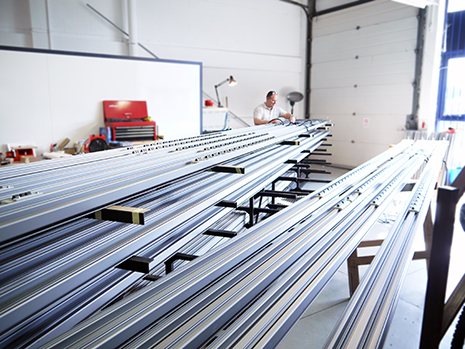
The new windsail solution was designed for luffing jib cranes facing tough space and safety restrictions
The world’s first retractable crane windsails have been put to work on cramped urban building sites, with thanks to some expert prototyping knowhow producing 1:1 scale models used for wind testing.
The design, which enables cranes to achieve a smaller parking radius whilst retaining the full operational wind speed limit, were designed for Select Plant Hire by Industrial Design Consultancy (IDC), making full advantage of its own in-house model making division.
A number of 3D printed SLA models were produced throughout the early design stages, followed by a full-sized working prototype of the windsail, which was almost 9 metres in length.

IDC Models’ production unit manufacturing the windsails
This prototype was then tested in winds exceeding 100kmh to ensure the system was able to withstand large forces.
Once the final design was approved, IDC Models used its production facilities to manufacture an initial batch of 32 individual windsails for four different models of Terex crane.
Each windsail comprises around 3,000 components, with electronic controls and aluminium extrusions of up to 8.6m length – for installation into jib sections at Select’s depot in St Neots, Cambridgeshire.
UK legislation means that cranes are often not allowed into neighbouring ‘airspace’ or have to manoeuvre around nearby obstacles, so luffing jib cranes are used. However, when not in use, the jib has to be raised fully, which if the crane is unable to adjust to the path of the wind – like a weather vane – puts them at risk of blowing over.
Luffing crane windsails have traditionally been made from heavier materials such as steel, although this can make the crane difficult to manoeuvre in windy conditions – leading to the idea of a retractable jib sail.
The new windsails are already at work across UK construction sites, thanks to the fast design and testing process.






